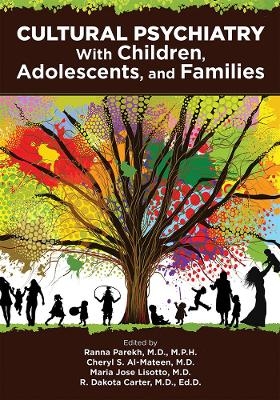
Cultural Psychiatry With Children, Adolescents, and Families
American Psychiatric Association Publishing (Verlag)
978-1-61537-333-8 (ISBN)
Although books on the cultural aspects of mental health already exist, Cultural Psychiatry With Children, Adolescents, and Families is one of only a few to focus specifically on the role of culture in mental health assessment, diagnosis, and care of children, adolescents, and their families. In the United States, more than 50% of children younger than 15 years identify as nonwhite, a designation that comprises many ethnicities and cultural backgrounds. In addition, diverse sexual/gender identities and religious/spiritual beliefs can render young people a "hidden" minority. This text was written for health care providers across all disciplines and clinical settings caring for the mental health of these patients and also serves as an indispensable companion to the Clinical Manual of Cultural Psychiatry for clinicians working with diverse populations. The editors, distinguished scholars and clinicians, as well as experts on diversity and inclusion, apply history, theory, and evidence-based practice to the various dimensions influencing mental health in children, adolescents, transitional-age youth, and families.
The book is comprehensive and clinically rich:
• Material is presented on a wide variety of ethnicities, including African American; American Indian, Alaskan Native, and Native Hawaiian/Pacific Islander; Asian American, Latinx, and Arab American cultures.
• The special mental health and medical needs of LGBTQ+ youth are addressed, as well as their different developmental trajectories. The book explores the mental health, medical, and structural interventions that can be taken to reduce the mental health and medical disparities they face and offers best practices, including the most recent guidelines for transgender youth wishing to transition.
• The volume emphasizes the importance of the DSM-5 Outline for Cultural Formulation, an instrument perhaps even more relevant in populations where development is in flux and family compositions are diverse. A chapter of complex case examples is included to help readers understand the role of the DSM-5 Cultural Formulation Interview.
• The impact of immigration status and the mental health burden of forcibly displaced children are discussed in detail, including a literature review on the mental health effects of migration; a discussion of protective factors and resilience in children and families; and strategies for working with migrant youth and families, including building trust, understanding the role of silence, and taking a family-centered approach.
• The paramount importance of remaining open-minded and taking a nonjudgmental stance when dealing with aspects of culture is emphasized throughout, as is intersectionality, a theoretical framework that recognizes individuals with multiple social or minority identities and their experience of layered, societal-based inequities due to their diverse individuality.
• The book is timely, with updated information to help clinicians address the impacts on youth and families of the COVID-19 pandemic and the movement for social justice.
The information found in Cultural Psychiatry With Children, Adolescents, and Families is down-to-earth, absorbing, and absolutely essential for clinicians and caregivers in our increasingly diverse world.
Ranna Parekh, M.D., M.P.H., DFAPA, is Chief Diversity and Inclusion Officer at the American College of Cardiology in Washington, D.C.; Past Deputy Medical Director and Director of the Division of Diversity and Health Equity at the American Psychiatric Association; and Consultant Psychiatrist at Massachusetts General Hospital in Boston, Massachusetts. Cheryl S. Al-Mateen, M.D., FAACAP, DFAPA, is Professor in the Departments of Psychiatry and Pediatrics at Virginia Commonwealth University School of Medicine in Richmond, Virginia. Maria Jose Lisotto, M.D., is Child and Adolescent Psychiatrist at Cambridge Health Alliance and Instructor in the Department of Psychiatry at Harvard Medical School in Cambridge, Massachusetts. R. Dakota Carter, M.D., Ed.D., is Child, Adolescent, and Adult Psychiatrist and Chief Medical Officer at Highlands Behavioral Health System in Denver, Colorado.
Foreword
Part I: Race and Ethnicity
Chapter 1: Introduction to Cultural Psychiatry
Chapter 2: The Black Diaspora: Cultural Psychiatry Perspectives on African American Children and Adolescents and Their Families
Chapter 3: A Broad Overview of American Indian, Alaskan Native, and Native Hawaiian/Pacific Islander Cultures
Chapter 4: Mental Health in Asian American Populations
Chapter 5: Bridging the Gap in Psychiatric Care of Latinx Youth and Families
Chapter 6: The Role of Culture, Stigma, and Bias on the Mental Health of Arab American Youth
Part II: Cultural Concepts
Chapter 7: Gender and Sexuality in the Twenty-First Century: Cultural Psychiatry for Children, Adolescents, and Families
Chapter 8: Religion and Spirituality in Child and Adolescent Cultural Psychiatry
Chapter 9: Diverse Families and Family Treatment
Part III: External Influences
Chapter 10: Social Determinants of Child and Adolescent Mental Health
Chapter 11: Aliens, Illegals, Deportees: Children, Migration, and Mental Health
Chapter 12: Clinical Strategies to Address the Mental Health of Forcibly Displaced Children (Refugees, Asylum Seekers, and Unaccompanied Minors): The Role of Silence, Family, and Socioecological Resilience
Chapter 13: The Global State of Child and Adolescent Mental Health
Chapter 14: Digital Media, Culture, and Child and Adolescent Mental Health
Chapter 15: Culture of Technology: Use of Telepsychiatry and Other Advances to Engage Children, Adolescents, and Transitional-Age Youth
Chapter 16: Rural Psychiatry
Part IV: Developmental Stages, Family, and Clinical Implications
Chapter 17: Infant Psychiatry: Culture and Early Childhood
Chapter 18: Adoption and Foster Care Systems
Chapter 19: Microaggressions: Effects in Early Life and Strategies to Overcome
Chapter 20: Cultural Aspects of College Mental Health
Part V: Miscellaneous: Cultural Formulation and Cases
Chapter 21: DSM-5 Outline for Cultural Formulation and Cultural Formulation Interview: Complex Case Examples
Chapter 22: Advocacy
Glossary
Appendix A: DSM-5 Outline for Cultural Formulation
Appendix B: DSM-5 Cultural Formulation Interview
Appendix C: DSM-5 Glossary of Cultural Concepts of Distress
| Erscheinungsdatum | 10.05.2021 |
|---|---|
| Zusatzinfo | 7 Figures; 55 Tables, unspecified |
| Verlagsort | VA |
| Sprache | englisch |
| Maße | 178 x 254 mm |
| Gewicht | 1157 g |
| Themenwelt | Medizin / Pharmazie ► Medizinische Fachgebiete ► Psychiatrie / Psychotherapie |
| ISBN-10 | 1-61537-333-0 / 1615373330 |
| ISBN-13 | 978-1-61537-333-8 / 9781615373338 |
| Zustand | Neuware |
| Haben Sie eine Frage zum Produkt? |
aus dem Bereich


